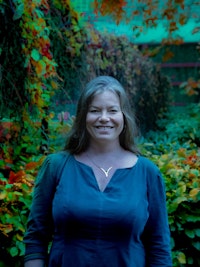Field of Study: Artisic Research
The Concrescence Project
The study is about innovations in vocal practice and composition through experiments with combining vocal techniques from different cultures.
Summary
The Concrescence Project is an aesthetically orientated research project that intends to bring about innovations in vocal practise and composition. The project also includes theoretical research and pedagogical practice.
Through the synergy between highly different, seemingly contradictory vocal traditions - ethnic as well as contemporary - new musical expressions can come into existence. In its present form, the project attempts to combine Western classical singing with harmonic chant (”diphonic” chant) and Scandinavian traditional singing styles (kveding, kulning etc.). To these sources is added a spectromorphological perspective (derived from the French Musique Concrète). Further reflection on the compositional possibilities of these elements makes evident the need for a theoretical understanding of microtonality and the series of harmonics (‘Just Intonation’).
Vocal exercises for improving note accuracy are being developed to help singers master microtonal intervals. Assistant Professor Gro Shetelig (The Norwegian Academy of Music) is working on the development of a Microtonal Ear Training method for singers; to be finished in 2012.
Improvisation is used as a means to exploit musical potential.
The project encourages a phenomenological approach – no expectations, clear observation of the moment, focus on concrete sound – rather than a priori models of musical organization.
The process
- The first phase of the project officially began in Oslo during the Ultima Festival 2005 with a four-day seminar/master class featuring the vocal ensemble Nordic Voices. Lectures and courses were presented by Tran Quang Hai, Berit Opheim, Lasse Thoresen, Gro Shetelig Kruse, Guy Reibel, Benoît Aubigny, Georg Friedrich Haas. The Ultima Festival/Geir Johnson acts as administrative coordinator of the project, with the support of the Norwegian Academy of Music. Georg Friederich Haas (Austria/Switzerland), Guy Reibel (Paris), Bernat Vivancos (Spain/Catalonia), Ragnhild Berstad (Norway); Henrik Ødegaard (Norway) and Lasse Thoresen were given commissions by Ultima to compose works that were performed 15 October, 2006, during the Ultima festival.
- The second phase was a project with Latvia Radio Koris and The Royal College of Music in Stockholm with support from Nordic Culture Point (Kulturkontakt Nord, Foreningen Norden) involving workshops with the choir and seminars with composers. Works by Nordic and Baltic composers were commissioned, for first performance during the Ultima Festival 2010, Oslo. Workshops and lectures were given by Gro Shetelig Kruse (microtonal ear training), Susanne Rosenberg (ethnic voice), Christian Zehnder (harmonic chant), Valdis Muktupavels (harmonic chant), Lectures on composition were presented by dr. Sven Ahlbäck (microtonal features of Scandinavian folk music), professor Karin Rehnquist (folk music and contemporary style), professor Toivo Tulev (Gregorian neumes, and contemporary composition) and professor Lasse Thoresen (microtonality, notation, just intonation). New works by Celma Liga, Kristaps Petersons, Karin Rehnquist, Lasse Thoresen,Toivo Tulev Gundega Smite, Martins Vilums were performed in Oslo during the Ultima festival, and in Riga during the Arena Festival autumn 2010.
- To facilitate rehearsing microtonal parts, and composing with microtones, a computer program called Micropalette has been developed.
- An elective course at the Norwegian Academy of Music with the Concrescence subjects has been developed by Gro Shetelig and Lasse Thoresen. It includes lessons in free improvisation with prof. Sidsel Endresen, and guest lecturers such as David Hykes (Harmonic Chant), Christian Zehnder (overtone singing), Berit Opheim (Norwegian folk song), Guy Reibel (Jeux vocaux). Open seminars during the Ultima festival have been integral to the project.
Documentation
Thoresen, T. (2014): "The Concrescence Project (2008-2010): Ideas, Processes, Experiences, Musical Works" in Tempo, Volume 68, Issue 267, pp 7-21 (Cambridge University Press)
Thoresen's composition for Latvisk Radiokor was released in Marseilles September 2013 (CD).
The project was formally concluded in 2010.
Articles relevant
Published: Feb 20, 2014 — Last updated: Nov 1, 2024


